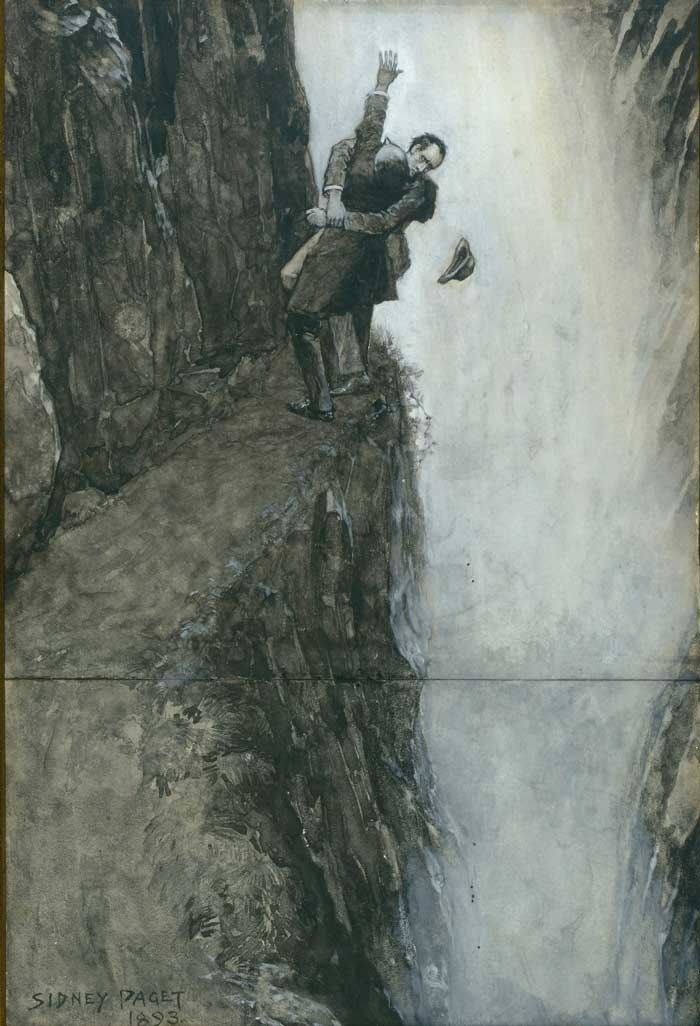Most economists are saying that, if the Democrats and Republicans don’t reach a budget agreement by January 2, the United States will go over, not a fiscal cliff, but a fiscal slope or a fiscal incline or a fiscal set of stairs. But the cliff image is much more dramatic. It’s also useful for my own purposes because it brings to mind what may be literature’s most famous example of a hero going over a cliff.
I am referring, of course, to Sherlock Holmes grappling with Professor Moriarty on the brink of the Reichenbach Falls in “The Final Problem.” Think of Obama and Boehner as you read the following passage. As an Obama enthusiast, of course, I see Holmes as the president:
An examination by experts leaves little doubt that a personal contest between the two men ended, as it could hardly fail to end in such a situation, in their reeling over, locked in each other’s arms. Any attempt at recovering the bodies was absolutely hopeless, and there, deep down in that dreadful caldron of swirling water and seething foam, will lie for all time the most dangerous criminal and the foremost champion of the law of their generation.
Luckily for England, Holmes has made special provisions that, despite his death, the country will benefit from the work he has done:
As to [Moriarty’s] gang, it will be within the memory of the public how completely the evidence which Holmes had accumulated exposed their organization, and how heavily the hand of the dead man weighed upon them.
That “dreadful caldron of swirling water and seething foam” is no joke–we could be plunged into a second recession–but, like Holmes, Obama has options that could benefit the country. That, at any rate, is what the always smart Jon Chait of New York Magazine believes. Indeed, Chait thinks that a deal can only be struck after we go over the “cliff” and that this is not a bad thing:
The effects of the fiscal cliff are cumulative, and the economic damage from waiting shortly into the New Year will probably be minimal to nonexistent. But the political dynamic resets in a way that makes a deal much easier to strike. Obama would already have most of the revenue he’s asking for. He could get all the additional revenue he needs without raising rates — he could even let rates drop a point or two to make Republicans feel better about things. Then the deal gets very easy for both sides.
If Chait is right, then Obama becomes like the Sherlock Holmes that Arthur Conan Doyle resurrected in “The Adventure of the Empty House.” Although he appears to go over the falls, in actuality he has drawn upon his special fighting skills to make sure (as he explains to Watson) that only his opponent pays a price:
[Moriarty] knew that his own game was up, and was only anxious to revenge himself upon me. We tottered together upon the brink of the fall. I have some knowledge, however, of baritsu, or the Japanese system of wrestling, which has more than once been very useful to me. I slipped through his grip, and he with a horrible scream kicked madly for a few seconds, and clawed the air with both his hands. But for all his efforts he could not get his balance, and over he went. With my face over the brink, I saw him fall for a long way. Then he struck a rock, bounded off, and splashed into the water.”
Think of Obama’s leverage as the expiring Bush tax cuts. Also to his advantage is the fact that he campaigned and was reelected on the promise of raising taxes on the rich. These are formidable assets to bring to a fight.
In The Return of Sherlock Holmes, the detective hero goes on to strike many more blows for justice. The reading public was well satisfied.


